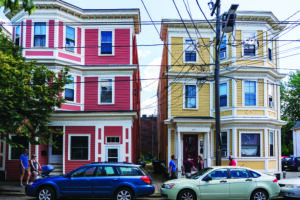
Triple-deckers in Salem in 2019. Like its 25 peer Gateway Cities, Salem has seen its median home prices jump in recent years, to $500,000 for the typical condominium and $682,000 for the typical single-family house. iStock photo
Areas of Greater Boston once considered bargains have seen some of the sharpest home-price appreciation over the last 10 years, leaving first-time buyers struggling.
Research from The Boston Foundation’s 2025 Greater Boston Housing Report Card found that, over the past decade, municipalities with lower 2015 home prices saw greater price growth than wealthier communities.
For example, Lawrence saw a 108 percent increase in the median single-family home price. The average home in Lawrence now costs $550,000, up from $264,741. By contrast, Cambridge saw only a 9 percent increase over the decade, but the median single-family home there costs $1.99 million.
“I think it’s just another sign that there’s very little affordability in Eastern Massachusetts,” said Tom Callahan, executive director of the Partnership for Financial Equity. “It used to be that a lot of the Gateway Cities were more affordable options, and I guess they still are more affordable than some of the wealthiest suburbs, obviously, but the increases show that they’re very much out of reach for a lot of first-time and first-generation homebuyers.”
With more buyers seeking out homes in these traditionally working-class, immigrant-heavy communities, the market responded and prices shot upward, said Anthony Lamacchia, founder and CEO of Waltham-based brokerage Lamacchia Realty.
A lack of inventory is at the heart of the issue, real estate experts and executives say. Prices will continue to rise as long as the housing shortage persists. Massachusetts needs to add 225,000 houses, condominiums and apartments, according to Healey administration housing officials.
Greater Boston’s desirability also plays a role. The region has a strong job market and is considered an enjoyable place to live.
“It’s an attractive place to live, right? People want to settle down here,” said Elliot Schmiedl, director of homeownership at the Massachusetts Housing Partnership. “People want to buy a home here. This market’s not acting like other parts of the country. I’ll read a lot about other parts of the country seeing significant price dips from COVID highs, and that’s not happening here in Greater Boston.”
Investors a Small, but Important Force
Investors aren’t playing a big role in the statewide housing market, representing a mere 7.1 percent of single-family and condominium sales in Massachusetts and 6.5 percent in the Boston metro area in the second quarter, according to Realtor.com. But some observers say increased investor activity is at least some adding extra demand in Gateway Cities.
“I think Brockton is an attractive place because there’s a lot of opportunity there,” said Al Becker, president and chief operating officer of Jack Conway. “There’s opportunity for investors. I think investors have a lot to do with driving up those prices because there’s a lot of housing stock in Brockton that could be improved upon.”
Brockton has seen the median price of its single-family homes increase by 72 percent over the last decade, The Boston Foundation’s Boston Indicators research team reported, citing data from The Warren Group, publisher of Banker & Tradesman.
Investor activity may be lower in Massachusetts compared to the rest of the country, Schmiedl said, but their ability to make all-cash purchases lets them outcompete ordinary buyers.
“Every one of those cash transactions, those are not low- to moderate-income, those are not first-time homebuyers,” he said. “Those are not normal people. That’s absolutely part of what’s driving prices up.”
Potential Buyers Priced Out
If the median single-family sale price in many historically affordable communities is now passing $500,000, the only choices for buyers appear to be moving farther out from Greater Boston’s core, or potentially leaving the area altogether.
The Boston Foundation report found the median starter home in the region – defined as the bottom third of the market by price – hit $505,319 in September.
That means the annual household income needed to afford a starter home in Greater Boston hit $162,224 this fall, up over $64,000 from 2021. Only 114,002 renter households in the region meet that threshold, the report found, a drop of over 99,000 families.
Those figures assume a household isn’t spending more than a third of its income on housing costs, the traditional threshold for considering someone “housing burdened.”
Because of its overall attractiveness, Schmiedl believes many buyers will do more to stay in Greater Boston than in other markets.
“I think, then, folks are faced with a choice. Would I rather move out of New England and own a home, and perhaps other quality-of-life measures are going to be reduced? Or do I do everything I can to try to stay here?” he said. “I don’t see a mass exodus or anything like that. I think people will work hard and scrape together and do what they can to stay where they want to be.”
More and more companies are calling their workers back to the office full- or part-time, potentially making a home in a distant but lower-cost market like central New Hampshire less attractive.
Fully remote work has dropped from 70 percent at the height of the pandemic to 26 percent nationwide, according to Gallup, while hybrid work has increased from 18 percent to 52 percent.
This return to the office, along with continued rate cuts and added inventory, could keep households in Greater Boston rather than moving elsewhere, said Becker, the Jack Conway COO.
“I think the whole remote work situation has slowed a little,” he said. “Generally, I think that prices have slowed and rates have started to drop a little. I think the biggest thing is that we’re starting to see a little more inventory. We’re starting to see prices slow down.”

Sam Lattof
More Affordability Help Urged
To keep buyers in Greater Boston, greater investment in affordable mortgage programs and affordable home construction may be necessary.
MHP and MassHousing have their own, popular mortgage programs for lower-income and first-time buyers that offer cheaper alternatives to traditional FHA loans that also typically come with appraisal requirements. They also run down payment assistance programs that help lower-income buyers scrape together money needed to put an offer down.
“I would hate to see where we would be as a state without the Massachusetts Housing Partnership programs,” Callahan said. “We need those programs. Those programs with additional interest rate discounts and payment assistance are absolutely vital to helping first-time homebuyers compete, because you’ve got to remember, they’re competing against other, more well-resourced homebuyers. Those are vital.”
But as affordability challenges grow, these programs lose some of their power. And construction of affordable condominiums appears set to shrink after the Healey administration proposed a $130 million, five-year cut to the popular CommonWealth Builder subsidy program, Banker & Tradesman reported last week. MassHousing paused applications for new funding last summer.
“I think the volume has surprised even us,” Schmiedl said of MHP’s down payment and low-cost mortgage programs. “It takes higher levels of assistance than it used to help close that affordability gap.”
Expanding access to these programs is difficult despite the demand.
“Public resources are finite enough, they’re not infinite,” he said. “You got to do the best job you can do to spread them out, make them impactful.”




